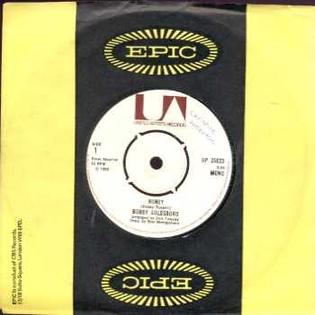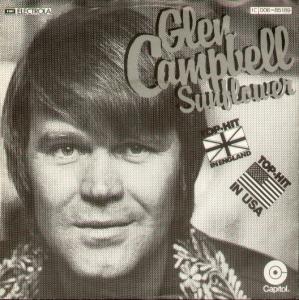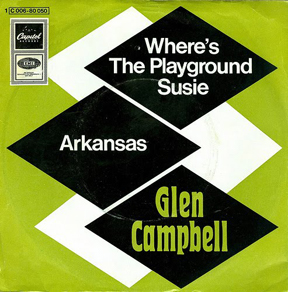
"Gentle on My Mind" is a song that was written and originally recorded by John Hartford, and released on his second studio album, Earthwords & Music (1967). Hartford wrote the song after watching Doctor Zhivago in 1966, as he was inspired by the film and his own personal experiences. The lyrics describe the reminiscences of lost love of a man as he travels through the country. An obituary for Hartford indicated that the lyrics are "about a hobo reminiscing about a lost love". The following year, Hartford released the song as a single on RCA Records.
Sonny Curtis is an American singer and songwriter. Known for his collaborations with Buddy Holly, he was a member of the Crickets and continued with the band after Holly's death. Curtis's best known compositions include "Walk Right Back", a major hit in 1961 for the Everly Brothers; "I Fought the Law", notably covered by the Bobby Fuller Four and the Clash; and "Love is All Around," the theme song for The Mary Tyler Moore Show.

"Honey", also known as "Honey (I Miss You)", is a song written by Bobby Russell. He first produced it with former Kingston Trio member Bob Shane, who was the first to release the song. It was then given to American singer Bobby Goldsboro, who recorded it for his 1968 album of the same name, originally titled Pledge of Love. Goldsboro's version was a hit, reaching No. 1 in several countries.

"Let It Be Me" is a 1960 single by The Everly Brothers. The song is an English-language cover of "Je t'appartiens", which had been released as a single in France by Gilbert Bécaud in 1955. The song was a top ten hit for The Everly Brothers in the United States and spawned many additional cover versions.

"Don't Pull Your Love" is the debut single by Hamilton, Joe Frank & Reynolds which became a top ten hit single in 1971. The song was written by Brian Potter and Dennis Lambert.
"It's Just a Matter of Time" is a Pop song written by Brook Benton, Clyde Otis, and Belford Hendricks. The original recording by Benton topped the Billboard Hot R&B Sides chart in 1959 and peaked at No. 3 on the Hot 100 pop chart, the first in a string of hits for Benton that ran through 1970.

"My Special Angel" is a popular song by Jimmy Duncan, published in 1957.

"Galveston" is a song written by Jimmy Webb and popularized by American country music singer Glen Campbell who recorded it with the instrumental backing of members of The Wrecking Crew. In 2003, this song ranked number 8 in CMT's 100 Greatest Songs in Country Music. Campbell's version, produced by Al De Lory, also went to number 1 on the country music charts. On other charts, "Galveston" went to number 4 on the Billboard Hot 100 and number one on the "Easy Listening" charts. It was certified gold by the RIAA in October 1969.
"And I Love You So" is a popular song written by folk singer and guitarist Don McLean and released on his 1970 debut album, Tapestry. Its chorus features an unusual rhyming scheme for a popular song: ABBA versus the usual AB(C or A)B.

"Only Love Can Break a Heart" is a popular song from 1962, performed by the American singer-songwriter Gene Pitney. The song was written by Hal David (words) and Burt Bacharach (music) and appears on Pitney's second album Only Love Can Break a Heart.

D-I-V-O-R-C-E is a studio album by American country artist Tammy Wynette. It was released in July 1968 via Epic Records and contained 11 tracks. Several recordings were cover tunes, including songs by Merle Haggard and The Beatles. Several new selections were also part of the collection, including the title track. Released as a single, the title track became Wynette's fourth number one song on the North American country charts in 1968. The album itself would also top the American country LP's chart in 1968. D-I-V-O-R-C-E received positive reviews from critics following its release.
"Little Green Apples" is a song written by Bobby Russell that became a hit for three different artists, with their three separate releases, in 1968. Originally written for and released by American recording artist Roger Miller, "Little Green Apples" was also released as a single by American recording artists Patti Page and O. C. Smith that same year. Smith's version became a #2 hit on both the Billboard Hot 100 and Billboard Hot Rhythm & Blues Singles charts, while Miller's version became a Top 40 hit on the Hot 100 as well as the UK Singles Chart. Page's version became her last Hot 100 entry. The song earned Russell a Grammy Award for Song of the Year and for Best Country Song. In 2013, "Little Green Apples" was covered by English recording artist Robbie Williams featuring American recording artist Kelly Clarkson, which became a top 40 hit in Mexico.

"Then You Can Tell Me Goodbye" is a song written by John D. Loudermilk. It was first released in 1962 by Don Cherry, as a country song and again as a doo-wop in 1967 by the group The Casinos on its album of the same name, and was a number 6 pop hit that year. The song has since been covered by Eddy Arnold, whose version was a number 1 country hit in 1968, and by Neal McCoy, whose version became a Top 5 country hit in 1996.

"Watching Scotty Grow" is a song written by country music singer-songwriter Mac Davis and recorded by Bobby Goldsboro in 1970 on his album, We Gotta Start Lovin. Davis recorded his version on his 1971 album, I Believe in Music.

"Country Boy " is a song written by Dennis Lambert and Brian Potter, and recorded by American country music singer Glen Campbell. It was released in October 1975 as the second and final single from the album, Rhinestone Cowboy.

"Sunflower" is a song written by Neil Diamond and recorded by American country music singer Glen Campbell. It was released in June 1977 as the second single from Campbell's 1977 album, Southern Nights. "Sunflower" was the last of eight number ones on the Easy Listening chart for Campbell. The single spent one week at number one and peaked at number 39 on the Billboard Hot 100. "Sunflower" peaked at number four on the US country chart.
"Muddy Mississippi Line" is a single by American country pop artist Bobby Goldsboro. Recorded on June 24, 1969 and released on July 18, 1969, it was the first single from his album Muddy Mississippi Line.
"Hey Little One", a song written by Dorsey Burnette and Barry De Vorzon, was initially recorded by Dorsey, released on May 2, 1960 on the Era label as the double A-side "Hey Little One"/"Big Rock Candy Mountain". "Hey Little One" reached number 48 on the Billboard Hot 100 chart. Musicians on the recording include veteran session drummer Earl Palmer.

"Where's the Playground Susie" is a song written by Jimmy Webb and recorded by American country music singer Glen Campbell. It was released in April 1969 as the second single from the album Galveston. The song peaked at number 26 on the Hot 100, number 28 on the U.S. Billboard Hot Country Singles chart, and number 8 on the Canadian RPM Top Singles chart.

"Summer (The First Time)" is a song by American singer Bobby Goldsboro, recorded for his album of the same name and released as a single in June 1973. It was written by Bobby Goldsboro, Ashley Abram and Timmy Tappan, and produced by Goldsboro and Bob Montgomery.














